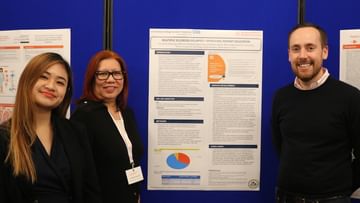Interval time of relapse to steroids: comparing our practice against NICE guidelines
This is a small audit in regard to initiation of steroids within two weeks of symptom onset as recommended by NICE guidelines at our NHS trust (Lancashire Teaching Hospital NHS Trust).
Method
Retrospective review of case notes for patients treated as outpatient during 2016 /17 at our Regional Centre for Neurology for an MS relapse, documenting adherence to NICE Guidelines.
The audit has been done on either side of the trust having a dedicated MS Relapse Clinic by a MS specialist and adhoc clinics covered by registrars of the firm the patient is under or the on-call registrars.
The usual referrals to these clinics would be through the MS specialists nurses who have good communication pathways with the patients or their GPs.
Number of patients seen with relapses: November In Nov/Dec: 16 – 20
Steroids prescribed: 9
Steroids were started within two weeks
Yes: 3 patients
No: 6 patients
Number of patients seen with relapses: Jan/feb In Jan/Feb 17 – 20
Steroids prescribed: 11
Steroids were started within two weeks
Yes: 5 patients
No: 3 patients
No clear documentation: 3
Outcome of patients after course of oral steroids
- Two patients reported little benefit from steroids
- One patient reported that she did not get an immediate response. But over time, symptoms improved.
It was very difficult to assess the other patients outcomes were not documented in the neurology clinic letters during follow up and correspondence.
There were two patients who reported symptom improvement after IV steroids three day course. No patients reported any improvement after oral steroids.
Reasons for not prescribing steroids:
- Relapse is a sensory event and hence, did not require steroid use: 3 patients
- Symptoms were more functional rather than consistent with a relapse
- Symptoms were seen as due to anxiety rather than relapse
- Presentation of bilateral optic neuritis is unusual and hence not treated on relapse. Ten weeks later this patient represented at the MS relapse clinic and was only prescribed a course of steroids then
- Paraesthesia described is due to the course of topiramate that was just started. The decision is to wait it out for two weeks – if it is unresolved, it probably represents demyelination
- Symptoms have been resolved/improving by the time seen in clinic: two patients
- Delay in reporting the symptoms.
Conclusions
Only 40-45% of patients are given steroids with the two week interval of symptom onset and the reason for the delay appears to be multifactorial ranging from delay in symptom reporting, delay in being seen in MS relapse clinics due to shortage of staffing and other resources.
The above audit proves that having a dedicated MS Specialist Team especially the MS Specialist Nurses would help the patients to have a port of contact to report their concerns and symptoms.
The timely decision of reviewing the patient either in a relapse clinic or by the registrars as needed will prevent hospital admission and unnecessary investigations under the medical teams at their local district general hospitals.
The main pitfall in these services seems to be the documentation of the response in the follow-up letters.
More MS Academy Relapse Projects

Encouraging excellence, developing leaders, inspiring change
MS Academy was established five years ago and in that time has accomplished a huge amount. The six different levels of specialist MS training are dedicated to case-based learning and practical application of cutting edge research. Home to national programme Raising the Bar and the fantastic workstream content it is producing, this is an exciting Academy to belong to.